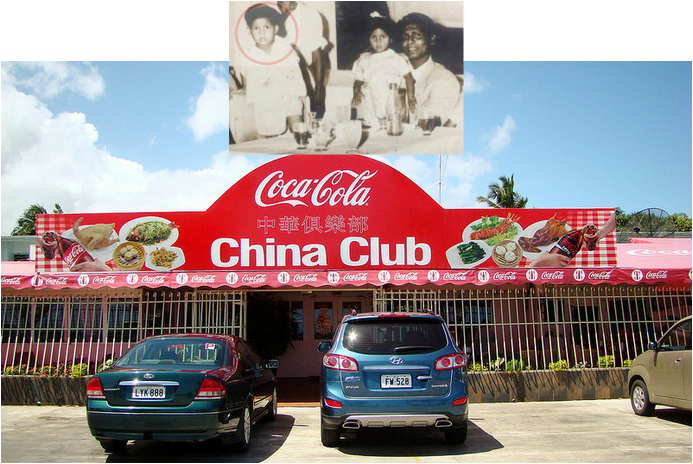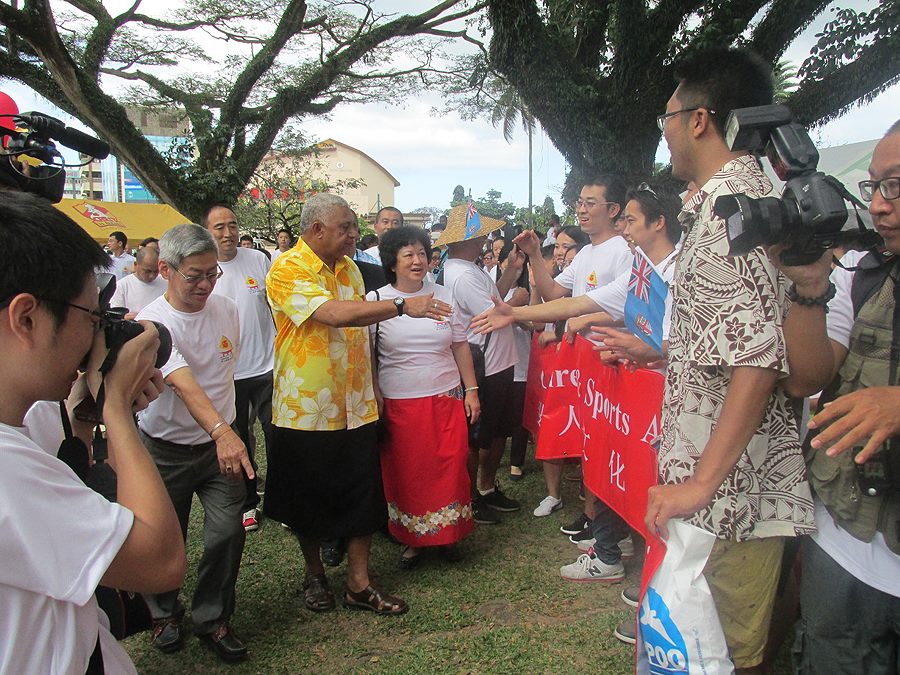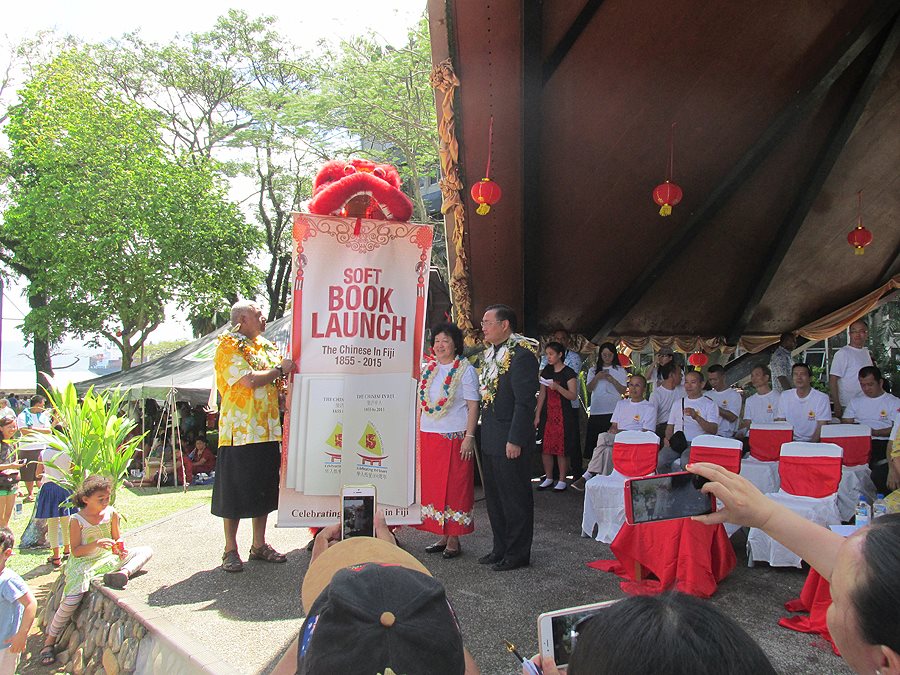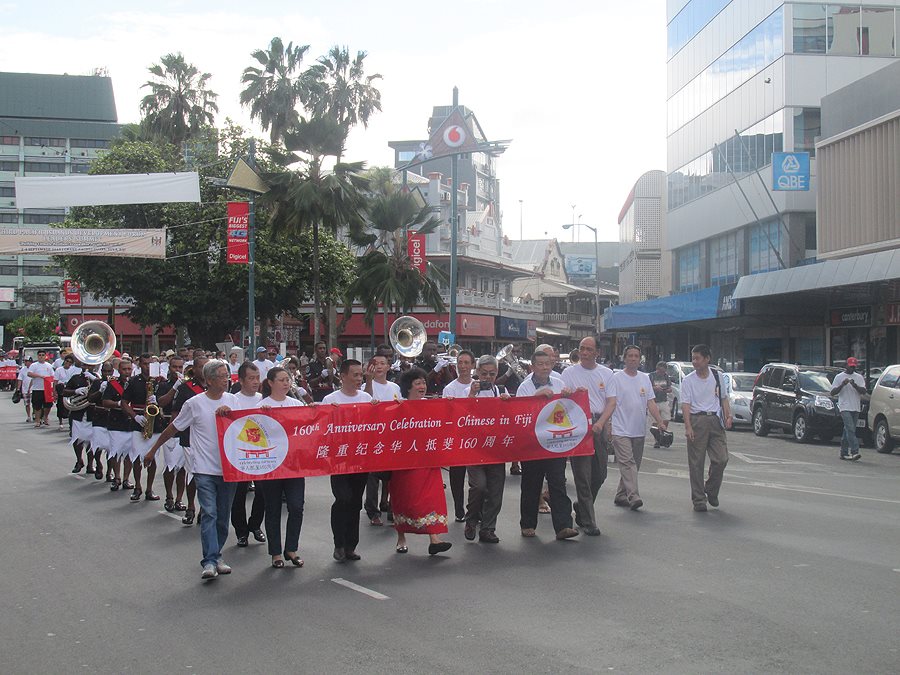
BEYOND RECOGNITION: The former old iconic China Club, now leased to a Chinese consortium. Fijileaks Editor-in-Chief (insert, circled at the old China Club) then a mere toddler, was a frequent guest to the China Club, for his 'old man' was an honorary member and contractor who had built the China Club in the late 1950s!
“THE CHINESE IN FIJI KEEP THEIR HEADS DOWN,
HOPE FOR THE BEST” -
Larry Dinger to Washington, 2006
 Larry Dinger: Former US ambassador to Fiji
Larry Dinger: Former US ambassador to Fiji In one of many leaked cables, the then American Ambassador to Fiji, Larry Dinger informed his masters back home: “THE CHINESE IN FIJI KEEP THEIR HEADS DOWN, HOPE FOR THE BEST”.
In his leaked cable, exposed by Wikileaks and dated 5 December 2006, Dinger begins by summarizing as follows: "The Chinese community in Fiji, estimated at 6,000-10,000 persons, is hoping to ride out the crisis caused by the military's announcement that it is deposing the lawfully elected government of Fiji. A PRC Embassy official told us the Embassy knows of only 17 Chinese residents who have left Fiji because of concerns for their safety. The Embassy is working with community leaders, he said, to finalize contingency evacuation and "stay in place" plans.
A prominent Chinese-Fijian leader said most of these plans and other emergency preparations have been generated by the Chinese community itself, though it welcomes any support it can get from the PRC Embassy and the Taiwan Trade Mission in Suva. Both officials we spoke to said they do not expect any violence against the Chinese community, but are taking precautions in light of the violence against Chinese in Tonga and the Solomon Islands. The PRC government has not taken a strong stand against the military's actions, in keeping with its "non-interference" policy, though it did endorse the UN Security Council press statement on Fiji.”
Chinese Embassy Developing Contingency Plans
Dinger also revealed the role the Chinese Embassy was playing in Suva as dictator Bainimarama was consolidating his brutal hold on power:
“Fei Mingxing, DCM at the PRC Embassy in Suva, told us the Embassy is working with the Chinese community in Fiji in developing contingency plans should the military takeover in Fiji lead to unrest or violence. The Embassy held meetings with community leaders each of the last two weeks, and contacted leaders by phone after the announcement by Commander Bainimarama 12/05 that he had assumed control of the government. The Embassy has made tentative plans to help with an evacuation, should it become necessary. Embassy staff and families all remain in Suva, said Fei. Employees have been advised to stock up on water and food supplies, based on the assumption that the Embassy will adopt a "stay in place" response to any unrest. Fei said he is aware of only 17 permanent Chinese residents of Fiji who have left because of safety concerns. He had heard of no problems since Baimimarama's announcement. Fei estimated that 6,000-10,000 people of Chinese descent currently reside in Fiji.”
Chinese Community Taking Proactive Stance with Seeto’s help
Dinger shed further light on the concrete role Seeto was playing to protect the Chinese community: “Dixon Seeto, former president of the Chinese Association of Fiji, told us 12/05 that while the PRC Embassy has been helpful, the local Chinese community in Fiji initiated almost all the contingency planning mentioned by Fei. Few among the entrenched Chinese community, he noted, have PRC passports. The Chinese Association has arranged for a large water tank to be installed at the Sun Yatsen school in Suva, the likely assembly point for Chinese if there is large-scale unrest. It has also tentatively arranged transportation to Nadi should an evacuation become necessary. The association is working closely with the police to ensure Chinese farmers in rural Fiji are looked after. The association has provided cell phones and other equipment to the police to make communication easier, he said. Seeto said his association works closely with the Taiwan Trade Mission in Suva, as well as the PRC Embassy, and will accept help from either.”
Seeto feared “Tongan Re-play of Violence” against Chinese in Fiji
A month before the dictator had seized power in Fiji, Nukualofa, the Tongan capital, had gone up in racial flames, with many Tongan-Chinese businesses directly targeted, burned, and looted by angry Tongans. Seeto and the Chinese Embassy in Fiji were taking no chances.
Dinger reported to Washington: “Seeto agreed with Fei that long-term Chinese residents will ride out the crisis, but said that more recent Chinese arrivals in Fiji, especially those with PRC passports or dual-citizenship, may pull up stakes more quickly. He noted with some disdain that the newly elected President of the Chinese Association (a New Zealand dual-citizen) was among those who have already left. Seeto has therefore once again assumed the de-facto presidency of the association. Seeto said that members of the established Chinese community in Fiji, numbering about 6,000, are accepted and well-integrated citizens of the country, and therefore feel relatively safe. Nevertheless, given the violence against Chinese in Tonga and the Solomons, the Chinese community must be prepared for the worst.”
Chinese Embassy adopts “Hands Off” attitude to dictator’s coup
Dinger, under a separate heading, “PRC Keeping its "Non-Interference" relayed the following: “Fei told us 12/06 that, as far as he is aware, the PRC has no plans to make any statement about the military's actions, in keeping with its "non-interference" foreign policy. He noted, however, that the PRC endorsed the 11/29 Security Council press statement on Fiji which called upon the Fiji military to "exercise restraint and avoid taking any action that would undermine the rule of law and run counter to the best interests of the people of Fiji.”
In conclusion, Dinger concurred with Seeto and Fei, noting in his cable: “We agree with Seeto and Fei that widespread violence against Chinese is unlikely. However, Chinese businesses are prominent throughout Fiji, and especially in central Suva. They could be a target if there is any breakdown in law and order after the military takeover. Given the violence that took place against Chinese businesses in Tonga, the proactive stance of the Chinese community seems entirely appropriate.”
In his leaked cable, exposed by Wikileaks and dated 5 December 2006, Dinger begins by summarizing as follows: "The Chinese community in Fiji, estimated at 6,000-10,000 persons, is hoping to ride out the crisis caused by the military's announcement that it is deposing the lawfully elected government of Fiji. A PRC Embassy official told us the Embassy knows of only 17 Chinese residents who have left Fiji because of concerns for their safety. The Embassy is working with community leaders, he said, to finalize contingency evacuation and "stay in place" plans.
A prominent Chinese-Fijian leader said most of these plans and other emergency preparations have been generated by the Chinese community itself, though it welcomes any support it can get from the PRC Embassy and the Taiwan Trade Mission in Suva. Both officials we spoke to said they do not expect any violence against the Chinese community, but are taking precautions in light of the violence against Chinese in Tonga and the Solomon Islands. The PRC government has not taken a strong stand against the military's actions, in keeping with its "non-interference" policy, though it did endorse the UN Security Council press statement on Fiji.”
Chinese Embassy Developing Contingency Plans
Dinger also revealed the role the Chinese Embassy was playing in Suva as dictator Bainimarama was consolidating his brutal hold on power:
“Fei Mingxing, DCM at the PRC Embassy in Suva, told us the Embassy is working with the Chinese community in Fiji in developing contingency plans should the military takeover in Fiji lead to unrest or violence. The Embassy held meetings with community leaders each of the last two weeks, and contacted leaders by phone after the announcement by Commander Bainimarama 12/05 that he had assumed control of the government. The Embassy has made tentative plans to help with an evacuation, should it become necessary. Embassy staff and families all remain in Suva, said Fei. Employees have been advised to stock up on water and food supplies, based on the assumption that the Embassy will adopt a "stay in place" response to any unrest. Fei said he is aware of only 17 permanent Chinese residents of Fiji who have left because of safety concerns. He had heard of no problems since Baimimarama's announcement. Fei estimated that 6,000-10,000 people of Chinese descent currently reside in Fiji.”
Chinese Community Taking Proactive Stance with Seeto’s help
Dinger shed further light on the concrete role Seeto was playing to protect the Chinese community: “Dixon Seeto, former president of the Chinese Association of Fiji, told us 12/05 that while the PRC Embassy has been helpful, the local Chinese community in Fiji initiated almost all the contingency planning mentioned by Fei. Few among the entrenched Chinese community, he noted, have PRC passports. The Chinese Association has arranged for a large water tank to be installed at the Sun Yatsen school in Suva, the likely assembly point for Chinese if there is large-scale unrest. It has also tentatively arranged transportation to Nadi should an evacuation become necessary. The association is working closely with the police to ensure Chinese farmers in rural Fiji are looked after. The association has provided cell phones and other equipment to the police to make communication easier, he said. Seeto said his association works closely with the Taiwan Trade Mission in Suva, as well as the PRC Embassy, and will accept help from either.”
Seeto feared “Tongan Re-play of Violence” against Chinese in Fiji
A month before the dictator had seized power in Fiji, Nukualofa, the Tongan capital, had gone up in racial flames, with many Tongan-Chinese businesses directly targeted, burned, and looted by angry Tongans. Seeto and the Chinese Embassy in Fiji were taking no chances.
Dinger reported to Washington: “Seeto agreed with Fei that long-term Chinese residents will ride out the crisis, but said that more recent Chinese arrivals in Fiji, especially those with PRC passports or dual-citizenship, may pull up stakes more quickly. He noted with some disdain that the newly elected President of the Chinese Association (a New Zealand dual-citizen) was among those who have already left. Seeto has therefore once again assumed the de-facto presidency of the association. Seeto said that members of the established Chinese community in Fiji, numbering about 6,000, are accepted and well-integrated citizens of the country, and therefore feel relatively safe. Nevertheless, given the violence against Chinese in Tonga and the Solomons, the Chinese community must be prepared for the worst.”
Chinese Embassy adopts “Hands Off” attitude to dictator’s coup
Dinger, under a separate heading, “PRC Keeping its "Non-Interference" relayed the following: “Fei told us 12/06 that, as far as he is aware, the PRC has no plans to make any statement about the military's actions, in keeping with its "non-interference" foreign policy. He noted, however, that the PRC endorsed the 11/29 Security Council press statement on Fiji which called upon the Fiji military to "exercise restraint and avoid taking any action that would undermine the rule of law and run counter to the best interests of the people of Fiji.”
In conclusion, Dinger concurred with Seeto and Fei, noting in his cable: “We agree with Seeto and Fei that widespread violence against Chinese is unlikely. However, Chinese businesses are prominent throughout Fiji, and especially in central Suva. They could be a target if there is any breakdown in law and order after the military takeover. Given the violence that took place against Chinese businesses in Tonga, the proactive stance of the Chinese community seems entirely appropriate.”
Bainimarama:Our cultural diversity is an important source of our strength
BAINIMARAMA’S SPEECH AT THE BOOK LAUNCH OF THE CHINESE IN FIJI 1855-2015 9/5/2015
Bula Vinaka, good morning, ni hao
Distinguished guests,
I am delighted to join you all as chief guest at the launch of the publication -- The Chinese in Fiji 1855-2015. This book tells the stories of the personalities who have formed one of Fiji’s most vibrant and successful cultural communities, our Chinese Fijians. This account documents – for the first time – the individual struggles of Chinese Fijians who left their ancestral homes in China and made new lives for themselves here in Fiji. Together, these stories are an important contribution to telling Fijian history and especially that of the ChineseFijian community.
As Fijians, our cultural diversity is an important source of our strength. And our ChineseFijian community has made an important contribution to the strength of our diversity ever since the first Chinese immigrants arrived in Fiji 160 years ago.
1855 marks the official arrival of the first Chinese in Fiji -- but there is speculation among historians that Chinese may have been here considerably earlier. I’ve recently been told that two Chinese men were living in Bau as early as 1808. And according to another historical account, there was a Chinese community in Macuata in the late 1820s. But the official history of the Chinese in Fiji needs a starting date. And the first confirmed arrival of a Chinese settler is a Mr. Moy Ba Ling, who settled in Fiji in 1855.
What do we know about Moy Ba Ling? Well he settled first in Australia where he adopted the name of Houng Lee. Then in 1855 he sailed to Fiji, where he built a number of businesses and established the Houng Lee family, with a reputation that continues to this day.
Since his arrival, Fiji’s Chinese community has enriched Fiji’s culture and helped develop our economy. The relatively small size of our Fijian Chinese community belies the large impact they have had on our development. Through their resourcefulness and diligence, our Chinese community in Fiji has produced a succession of leaders in business, medicine, education, and a wide range of other sectors. They have played a substantial role in enhancing Fiji’s international standing and contributing to our national life. And I am honoured, on behalf of every Fijian, to extend my congratulations to your community on the 160th anniversary of your arrival in Fiji.
Over those 160 years, Chinese- Fijians have become an integral part of our nation. They have brought with them the best of Chinese culture, and every Fijian is certainly fond of Chinese food. Chop Suey and Chow Mein are so much a part of our diet that we tend to regard them as Fijian dishes.
Chinese festivals such as the Chinese New Year and Moon Festival are also celebrated. These too are arguably Fijian festivals as well. Chinese medicine has also been widely embraced, whether it is herbal medicine or acupuncture.
So ladies and gentlemen, the wider Fijian community thanks you for the huge contribution you have made to our national life and joins me in wishing you a happy 160th Anniversary.
It is a celebration of 160 years of solid achievement. And the history of the ChineseFijian contribution is told through the remarkable individual stories in this book, which I urge every Fijian to read. I always say that we need a lot more books to be written in Fiji about the events that have shaped our nation and this is an extremely valuable addition to our appreciation of the history of Fiji as a whole.
Ladies and Gentlemen, being Fijian is not about your ethnicity or religion. It is not about your place of birth or social status. It is not about your chosen trade or profession. To be Fijian is to value opportunity and justice for all. To be Fijian is to work hard, be patriotic and help build Fiji’s future. To be Fijian is to contribute to the betterment of our society.
I congratulate you all again on this, the 160th Anniversary of the Chinese in Fiji. And again, urge everyone who can get a hold of a copy of this book to do so. The wonderful story of your community is to be found in these pages and these stories deserve as wide an audience as possible. And while they are the stories of the past, they also tell a story of a promising future.
Vinakavakalevu. XieXie Ni.
Bula Vinaka, good morning, ni hao
Distinguished guests,
I am delighted to join you all as chief guest at the launch of the publication -- The Chinese in Fiji 1855-2015. This book tells the stories of the personalities who have formed one of Fiji’s most vibrant and successful cultural communities, our Chinese Fijians. This account documents – for the first time – the individual struggles of Chinese Fijians who left their ancestral homes in China and made new lives for themselves here in Fiji. Together, these stories are an important contribution to telling Fijian history and especially that of the ChineseFijian community.
As Fijians, our cultural diversity is an important source of our strength. And our ChineseFijian community has made an important contribution to the strength of our diversity ever since the first Chinese immigrants arrived in Fiji 160 years ago.
1855 marks the official arrival of the first Chinese in Fiji -- but there is speculation among historians that Chinese may have been here considerably earlier. I’ve recently been told that two Chinese men were living in Bau as early as 1808. And according to another historical account, there was a Chinese community in Macuata in the late 1820s. But the official history of the Chinese in Fiji needs a starting date. And the first confirmed arrival of a Chinese settler is a Mr. Moy Ba Ling, who settled in Fiji in 1855.
What do we know about Moy Ba Ling? Well he settled first in Australia where he adopted the name of Houng Lee. Then in 1855 he sailed to Fiji, where he built a number of businesses and established the Houng Lee family, with a reputation that continues to this day.
Since his arrival, Fiji’s Chinese community has enriched Fiji’s culture and helped develop our economy. The relatively small size of our Fijian Chinese community belies the large impact they have had on our development. Through their resourcefulness and diligence, our Chinese community in Fiji has produced a succession of leaders in business, medicine, education, and a wide range of other sectors. They have played a substantial role in enhancing Fiji’s international standing and contributing to our national life. And I am honoured, on behalf of every Fijian, to extend my congratulations to your community on the 160th anniversary of your arrival in Fiji.
Over those 160 years, Chinese- Fijians have become an integral part of our nation. They have brought with them the best of Chinese culture, and every Fijian is certainly fond of Chinese food. Chop Suey and Chow Mein are so much a part of our diet that we tend to regard them as Fijian dishes.
Chinese festivals such as the Chinese New Year and Moon Festival are also celebrated. These too are arguably Fijian festivals as well. Chinese medicine has also been widely embraced, whether it is herbal medicine or acupuncture.
So ladies and gentlemen, the wider Fijian community thanks you for the huge contribution you have made to our national life and joins me in wishing you a happy 160th Anniversary.
It is a celebration of 160 years of solid achievement. And the history of the ChineseFijian contribution is told through the remarkable individual stories in this book, which I urge every Fijian to read. I always say that we need a lot more books to be written in Fiji about the events that have shaped our nation and this is an extremely valuable addition to our appreciation of the history of Fiji as a whole.
Ladies and Gentlemen, being Fijian is not about your ethnicity or religion. It is not about your place of birth or social status. It is not about your chosen trade or profession. To be Fijian is to value opportunity and justice for all. To be Fijian is to work hard, be patriotic and help build Fiji’s future. To be Fijian is to contribute to the betterment of our society.
I congratulate you all again on this, the 160th Anniversary of the Chinese in Fiji. And again, urge everyone who can get a hold of a copy of this book to do so. The wonderful story of your community is to be found in these pages and these stories deserve as wide an audience as possible. And while they are the stories of the past, they also tell a story of a promising future.
Vinakavakalevu. XieXie Ni.




